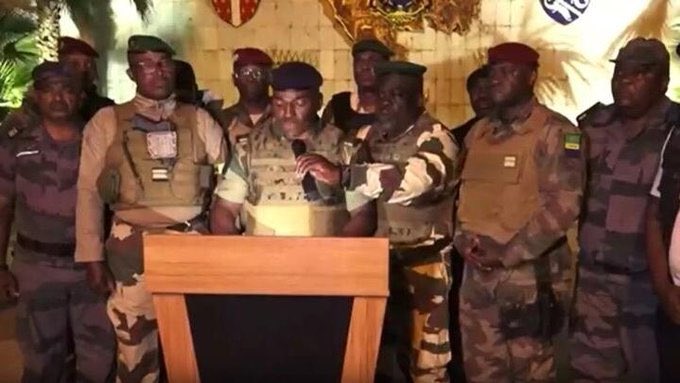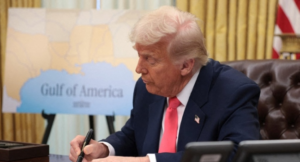
Amidst fears of escalating crisis of coups in Africa, soldiers in Garbon, a few moments ago, are said to have seized power suspending democratic rule in the country.
The unfolding drama in Garbon , according to reports, has seen Army officers showing up on national television in Gabon to announce that they have taken power.
Complaining about the irregularities in the country’s elections, They stated that they were annulling the results of Saturday’s polls, in which President Ali Bongo was declared the winner.
The soldiers seen on national television
There are reports of heavy gunfire in the country especially the capital.
BBC reports quoted soldiers saying the country’s borders had been closed “until further notice”.
One of the soldiers said on TV channel Gabon 24: “We have decided to defend peace by putting an end to the current regime.”
This, he added, was down to “irresponsible, unpredictable governance resulting in a continuing deterioration in social cohesion that risks leading the country into chaos”.
There was no immediate response by the government to the soldiers’ announcement.
As in previous general elections in Gabon, there were serious concerns about the process in Saturday’s vote.
Main opposition candidate Albert Ondo Ossa complained that many polling stations lacked ballot papers bearing his name, while the coalition he represents said the names of some of those who had withdrawn from the presidential race had still been on the ballot sheet.
Campaign group Reporters Without Borders said foreign media had been banned from setting foot in the country to cover the vote.
As polls closed, the government announced a curfew and suspension of internet access for security reasons.
Both of Mr Bongo’s previous wins were disputed as fraudulent by opponents. This time, controversial changes were made to voting papers just weeks before election day.
Mr Bongo came to power when his father Omar died in 2009.
In 2018, he suffered a stroke which sidelined him for almost a year and led to calls for him to step aside.
The following year, a failed coup attempt saw mutinying soldiers sent to prison.






